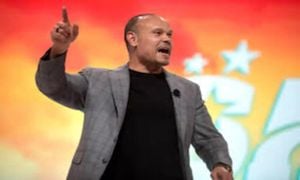Unilever, the British consumer goods giant known for popular brands like Ben & Jerry's ice cream and Dove soap, has announced the departure of its chief executive officer, Hein Schumacher, effective March 1st. His resignation, which follows less than two years in the position, was described by the company as being by "mutual agreement." The transition was revealed just as Unilever reported disappointing profit figures for 2024.
According to Unilever's chairman Ian Meakins, the board expressed satisfaction with some aspects of the company's performance, stating, "while the board is pleased with Unilever's performance in 2024, there is much more to do to deliver best-in-class results." Following the announcement, Unilever's shares fell by three percent on London's FTSE 100 index, even as the market overall showed positive trends.
Schumacher took up the role as CEO in July 2023, succeeding Alan Jope, who faced scrutiny from activist investors over his failed takeover bid for the well-known consumer brand. Upon his appointment, Schumacher aimed to reinvigorate growth through significant restructuring initiatives, which included reducing the workforce and planning to spin off Unilever's ice cream business.
Unfortunately, Schumacher encountered difficulties during his tenure, contending with two consecutive years of disappointing annual results. These downturns were, in part, attributed to the firm’s exit from Russia following geopolitical tensions and various restructuring costs. The company's strategic plan under Schumacher was intended to reposition Unilever on the path to improved performance, as Meakins stated, "the strategic plan has put Unilever on a path to higher performance, and the board is committed to accelerating its execution."
Effective March 1, finance chief Fernando Fernandez will step up to fill Schumacher's role. Fernandez has been praised for his capability to drive rapid change within the organization and is expected to usher Unilever's transformations with greater urgency. His promotion follows just over one year as CFO, and he previously led the company's beauty and wellbeing division, as well as business units across Latin America, Brazil, and the Philippines.
During the transition, Meakins commended Schumacher for his achievements, noting his strategic acumen and contributions to the company’s financial health, especially pointing to the progress made during 2024. "The growth action plan has put Unilever on a path to higher performance, and the board is committed to accelerating its execution", Meakins emphasized. He praised Schumacher's ability to reset the company’s strategy thoughtfully and to bring discipline and focus.
Upon his departure, Schumacher will continue to receive his annual fixed salary of €1.85 million until he officially leaves the firm, and he will be treated as a "good leaver" concerning his outstanding incentives. Reflecting on his time at Unilever, Schumacher stated, "It has been a privilege to lead Unilever. We have made real progress, and I am proud of what we have achieved in such a short period of time."
Looking to the future, Fernandez articulated his vision for Unilever, stating, "Our focus will be on building a future-fit portfolio with an attractive growth footprint and delivering unmatched functional and perceivable superiority across our top 30 power brands." Under his guidance, the company aims to maintain momentum on its existing strategic initiatives established under Schumacher's leadership.
Despite Schumacher's departure, Unilever revealed strong financial growth for the full year of 2024, reporting a sales increase of 4.2%, supported by significant growth from its power brands. Fernandez will likely continue pursuing the broad outlines of Schumacher's reform policies, which included shedding underperforming brands.
Unilever has undertaken to jettison several classic Dutch brands as part of its strategic refocusing. Brands such as Unox and Conimex have been eliminated, with the intent to prioritize their thirty largest brands, resulting in the decision to spin off the ice cream division as no buyers emerged willing to purchase it.
The company also intends to significantly upscale innovation efforts, indicated by plans to premiumize products and expand its market presence, aiming to quadruple innovation opportunities. Within this restructuring push, rumors around the potential sale of other brands, including the Vegetarian Butcher, suggest Unilever is committed to refining its brand offerings.
Unilever's leadership change reflects broader trends and ambitions within the consumer goods sector, particularly as companies increasingly seek adaptable strategies to respond to shifts within global markets. With Fernández now at the helm, analysts and stakeholders will be closely monitoring whether the new CEO can achieve the speed and efficiency improvements deemed necessary to reclaim Unilever's competitive edge.



